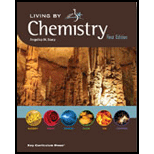
Interpretation: The reason of less stability of more active metals needs to be explained.
Concept introduction: The reactivity series of metal in the order of increasing reactivity is,
Gold < Silver < Mercury < Bismuth < Antimony < Hydrogen < Lead < Tin < Nickel < Cobalt < Cadmium < Iron < Chromium < Zinc < Manganese < Aluminium < Calcium < Strontium < Barium < Lithium < Sodium < Potassium
Answer to Problem 2E
The metals that are more active also considered less stablebecause they lose electrons and they easily form a metal oxide generating an impure metal.
Explanation of Solution
The reactivity series of metal in the order of increasing reactivity is,
Gold < Silver < Mercury < Bismuth < Antimony < Hydrogen < Lead < Tin < Nickel < Cobalt < Cadmium < Iron < Chromium < Zinc < Manganese < Aluminium < Calcium < Strontium < Barium < Lithium < Sodium < Potassium
The active metals are usually less stable because they lose electrons and they easily form a metal oxide generating an impure metal. This is because, metal high in the activity series reacts in a vigorous way with compounds and gives up electrons to form positive ions easily and also easily undergoes corrosion. While, a metal low in the activity series, does not vigorously reacts with chemicals and does not easily give up electrons to form positive and undergo corrosion easily.
The metals that are more active also considered less than the metals that are less active.
Chapter U5 Solutions
Living By Chemistry: First Edition Textbook
Additional Science Textbook Solutions
Brock Biology of Microorganisms (15th Edition)
Campbell Biology: Concepts & Connections (9th Edition)
Anatomy & Physiology (6th Edition)
Human Anatomy & Physiology (2nd Edition)
Microbiology: An Introduction
Chemistry: An Introduction to General, Organic, and Biological Chemistry (13th Edition)
- (f) SO: Best Lewis Structure 3 e group geometry:_ shape/molecular geometry:, (g) CF2CF2 Best Lewis Structure polarity: e group arrangement:_ shape/molecular geometry: (h) (NH4)2SO4 Best Lewis Structure polarity: e group arrangement: shape/molecular geometry: polarity: Sketch (with angles): Sketch (with angles): Sketch (with angles):arrow_forward1. Problem Set 3b Chem 141 For each of the following compounds draw the BEST Lewis Structure then sketch the molecule (showing bond angles). Identify (i) electron group geometry (ii) shape around EACH central atom (iii) whether the molecule is polar or non-polar (iv) (a) SeF4 Best Lewis Structure e group arrangement:_ shape/molecular geometry: polarity: (b) AsOBr3 Best Lewis Structure e group arrangement:_ shape/molecular geometry: polarity: Sketch (with angles): Sketch (with angles):arrow_forward(c) SOCI Best Lewis Structure 2 e group arrangement: shape/molecular geometry:_ (d) PCls Best Lewis Structure polarity: e group geometry:_ shape/molecular geometry:_ (e) Ba(BrO2): Best Lewis Structure polarity: e group arrangement: shape/molecular geometry: polarity: Sketch (with angles): Sketch (with angles): Sketch (with angles):arrow_forward
 ChemistryChemistryISBN:9781305957404Author:Steven S. Zumdahl, Susan A. Zumdahl, Donald J. DeCostePublisher:Cengage Learning
ChemistryChemistryISBN:9781305957404Author:Steven S. Zumdahl, Susan A. Zumdahl, Donald J. DeCostePublisher:Cengage Learning ChemistryChemistryISBN:9781259911156Author:Raymond Chang Dr., Jason Overby ProfessorPublisher:McGraw-Hill Education
ChemistryChemistryISBN:9781259911156Author:Raymond Chang Dr., Jason Overby ProfessorPublisher:McGraw-Hill Education Principles of Instrumental AnalysisChemistryISBN:9781305577213Author:Douglas A. Skoog, F. James Holler, Stanley R. CrouchPublisher:Cengage Learning
Principles of Instrumental AnalysisChemistryISBN:9781305577213Author:Douglas A. Skoog, F. James Holler, Stanley R. CrouchPublisher:Cengage Learning Organic ChemistryChemistryISBN:9780078021558Author:Janice Gorzynski Smith Dr.Publisher:McGraw-Hill Education
Organic ChemistryChemistryISBN:9780078021558Author:Janice Gorzynski Smith Dr.Publisher:McGraw-Hill Education Chemistry: Principles and ReactionsChemistryISBN:9781305079373Author:William L. Masterton, Cecile N. HurleyPublisher:Cengage Learning
Chemistry: Principles and ReactionsChemistryISBN:9781305079373Author:William L. Masterton, Cecile N. HurleyPublisher:Cengage Learning Elementary Principles of Chemical Processes, Bind...ChemistryISBN:9781118431221Author:Richard M. Felder, Ronald W. Rousseau, Lisa G. BullardPublisher:WILEY
Elementary Principles of Chemical Processes, Bind...ChemistryISBN:9781118431221Author:Richard M. Felder, Ronald W. Rousseau, Lisa G. BullardPublisher:WILEY





